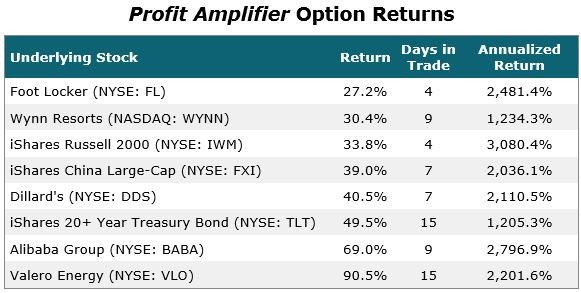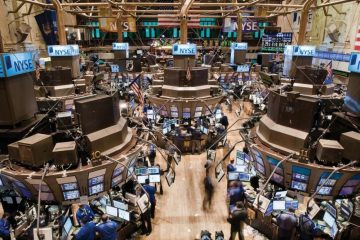How Average Traders are Making Gigantic Annualized Returns

The sharp correction in stocks has investors searching for value, but upside opportunities will likely be limited as investors cope with various global economic risks and stagnant earnings growth.
So, with the major indices below their 200-day moving averages, a key bearish indicator, I am searching for stocks that are bucking that technical trend.
Those are the ones most likely to deliver bullish profits — sometimes in a very short amount of time given the high volatility in the market right now.
For instance, last week, my Profit Amplifier readers closed a trade in international footwear and apparel giant Foot Locker (NYSE: FL) for a 27% return in just four days. That’s right, we opened the trade on a Tuesday and closed it on a Friday. That works out to a stunning 2,481% annualized gain.
There were two keys to our success with this trade that I’d like to share so you can potentially replicate them in your portfolio.
First, as I mentioned, Foot Locker was seriously bucking the bearish trend of the broader market.
At the time of my trade recommendation, the stock was up nearly 30% year to date while the S&P 500 was down 3.3%.
After a decline in mid-August, FL immediately recovered and began setting a series of higher highs and higher lows, which is the very definition of a bullish trend. What’s more, shares not only never violated their 200-day moving average, but they quickly climbed back above their 20-day and 50-day moving averages. This was a sign the stock wanted to run in the near term.
This resiliency amidst a broader market shellacking was admirable. And while I was a little worried about shaky investors’ willingness to seriously commit to bullish trades, retail has been a bright spot in a mediocre data landscape.
This is no accident, of course. With unemployment at its lowest level in seven years and the cost of fuel and other commodities at multiyear lows, consumers have cash to burn. Analysts are also predicting a 5.7% jump in holiday shopping sales this year, which would be the strongest year-over-year growth since the 2011 season.
Against this backdrop, I was confident FL could run to $ 78 — which was just below the 61.8% Fibonacci level on the chart for the technically minded trader — by mid-January. It was a conservative target to be sure, but given the market’s recent behavior, caution seemed warranted.
This price target was set less than 6% above where FL was trading at the time, though… so you may be wondering how I landed 27% in less than a week.
That brings me to the second key component of this trade.
I didn’t tell my Profit Amplifier readers to buy shares of Foot Locker. Instead, I advised them to purchase a call option on the stock.
Buying a call option is similar to buying shares of a stock. In both cases, you are going “long” (bullish) on the company. But instead of buying the stock outright, you are buying a contract that gives you the right (but not the obligation) to buy the stock at a certain price (the strike price) at a future date (the expiration date). This allows you to enjoy all of the upside of the stock with limited downside risk.
In practice, rather than buy the stock at the strike price, we simply sell back the option for a profit or loss.
The main benefit of options is leverage. One contract controls 100 shares of a stock, but it costs much less to enter into one contract than buying 100 shares of a stock outright.
In the case of FL, I recommended buying call options with a $ 62.50 strike price that expired in January.
We entered the position on Sept. 22 at a cost of $ 11.40 per share, or $ 1,140 per contract — much less than it would take to purchase 100 shares of FL. What’s more, we set a stop-loss on the option at $ 7, so the absolute most money we were risking was $ 440 ($ 1,140 cost per contract minus $ 700 stop).
As long as FL rose above $ 73.90 ($ 62.50 strike price plus $ 11.40 cost of option) before the option expired on Jan. 15, we would make a profit.
The trade worked out even better than I hoped. On Sept. 24 after the close, Nike (NYSE: NKE) reported quarterly earnings that blew past estimates. The next day, Nike soared and shares of Foot Locker went with it.
Just four days after we bought the options, FL was up about 6% and the options hit my target, returning 27%. As I said, that works out to an annualized gain of 2,481%.
While these kinds of returns aren’t impossible with stocks, they certainly are rare. With options, on the other hand, they are much more common.
And (not to toot my own horn) the returns I’ve led my Profit Amplifier readers to in just a matter of days are far from average. So far in 2015, we’ve closed eight trades with an annualized gain of more than 1,000%.

Each of these trades was open no more than 15 days. Not all of our trades are closed that quickly, but if you want the chance to make 1,000%-plus annualized gains, I urge you to take just a few minutes to learn more about my strategy.
I’ve put together a presentation that details how I uncover trades like these. Stay tuned at the end for the chance to get my next trade recommendation sent directly to your inbox. Click here to watch.

